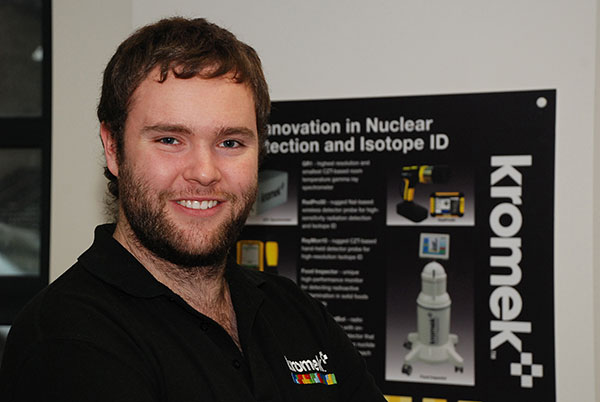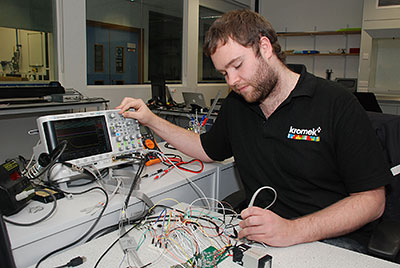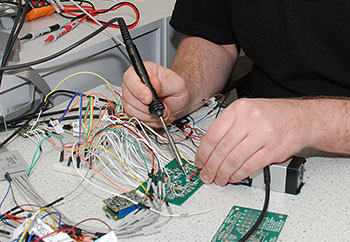£120k KTP to produce portable rapid radiation detection devices
 Graduate Richard Haigh will spend two years with Kromek working on the project to develop a new neutron detection device, small enough to be worn by the user, as part of his KTP Associate post.
Graduate Richard Haigh will spend two years with Kromek working on the project to develop a new neutron detection device, small enough to be worn by the user, as part of his KTP Associate post.
Fri, 13 Feb 2015 16:39:00 GMT
Kromek UK will work with Huddersfield researchers to develop new neutron detection devices, small enough to be worn by the user
 ULTRA-portable devices that will enable rapid detection of radiation in locations such as airports and science labs are being developed by an Anglo-American technology company that has a research base in Huddersfield. Now, a UK government-funded scheme has enabled the recruitment of a graduate from the town’s university, who has embarked on a two-year project to develop electronic circuitry for the new generation of devices.
ULTRA-portable devices that will enable rapid detection of radiation in locations such as airports and science labs are being developed by an Anglo-American technology company that has a research base in Huddersfield. Now, a UK government-funded scheme has enabled the recruitment of a graduate from the town’s university, who has embarked on a two-year project to develop electronic circuitry for the new generation of devices.
The company is Kromek, which has a global market for its products. It initially specialised in gamma ray and X-ray detection devices but decided to diversify into neutron detection. This is the speciality of the company’s lab that is now established at the University of Huddersfield’s 3M Buckley Innovation Centre (3M BIC).
The Kromek facility in Huddersfield is headed by Dr Ed Marsden, and his team currently includes Richard Haigh, who last year completed his BEng degree in electronics at the University. When Kromek and the University’s School of Computing and Engineering were awarded a £120,000 Knowledge Transfer Partnership (KTP), part-funded by the Government via the official body Innovate UK, Richard earned the post of KTP Associate.
He will spend two years with Kromek working on the project to develop a new neutron detection device, small enough to be worn by the user. Electronic circuitry has been designed by Dr Marsden – who formerly worked in the steel industry, where radiation detection is an important issue – and Richard is playing a key role in analogue circuitry development, leading to a device that is not only miniaturised but also more cost-efficient and uses less power.
New markets
The markets that Kromek aims to penetrate with the new neutron detectors include the nuclear industry and science labs, plus the field of security, where there is an increasingly vital need for the rapid detection of illicit and smuggled radioactive material in locations such as airports.
The detectors incorporate solid state silicon photo multipliers that react to a flash of light from a scintillator when a gamma ray or neutron enters it. KTP Associate Richard Haigh is using the range of scientific and technical knowledge he gained from his BEng course, plus newly-acquired areas of expertise, to carry out work on improvements to the solid state circuitry. His work ranges from computer simulation and programming to practical work with the soldering iron when developing circuit boards.
 An element of the KTP is that he will work towards a Master’s degree during the course of the project. His academic supervisor is Dr Pete Mather, based in the School of Computing and Engineering – adjacent to the 3M BIC – and he has been impressed with Richard’s contribution to the project.
An element of the KTP is that he will work towards a Master’s degree during the course of the project. His academic supervisor is Dr Pete Mather, based in the School of Computing and Engineering – adjacent to the 3M BIC – and he has been impressed with Richard’s contribution to the project.
Dr Mather is Course Leader for MEng, BEng and BSc electronics courses in the School and when he learned that Ed Marsden was seeking a location for a new Kromek lab, he recommended the 3M BIC. Dr Marsden is delighted with the choice. “It is an excellent facility with we all the IT infrastructure and secretarial support that you need. Plus, it’s a very nice place to be.”
High calibre staff
Kromek’s UK HQ is in Durham, and the Huddersfield team – currently three-strong – collaborates closely with colleagues there, who include scientists and product designers. The company’s customer base is worldwide and it has considerable experience working on projects backed by the US and UK governments.
Dr Marsden is enthusiastic about KTPs, which enable companies to work closely with universities. Two thirds of the cost of projects are provided by Innovate UK, formerly known as the Technology Strategy Board.
“They are a very good way of getting high calibre staff who are well motivated and well supported. The associates have the benefit of not only working in an interesting role but also gaining a new academic qualification at the end of it.”







